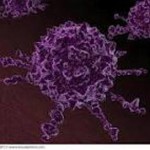Scientists Discover New Facts About Cancer-Fighting Molecules
Experts discovered recently that MicroRNAs or miRNAs are tiny RNA molecules that have about 20 nucleotides and do not code for proteins. Further, they regulate many important processes in cells by binding to target messenger RNAs. The production of some miRNAs in cancer is often reduced or amplified. This affects miRNAs that control the activity of cancer-promoting genes.
The transcription factor called NFkappaB is a key molecule in the development of cancer, which is an important switch for many genes with inflammation-promoting effects. Professor Dr. Stefan Wiemann and collaborators at DKFZ have now studied whether microRNAs that affect NFkappaB production are deregulated in breast cancer.
Together with colleagues at Heidelberg and Tuebingen University Hospitals, the DKFZ team studied over 800 miRNAs and discovered a family of RNA molecules known as miR-520, which particularly strongly reduce the production of NFkappaB.
However, miR-520 does not only act like a cancer stoppage by suppressing NFkappaB but also blocks another cancer-promoting signaling pathway that is triggered by growth factor TGF-beta that signals to malignant cells to be less firmly anchored in the tissue and, thus, better able to invade surrounding organs.
